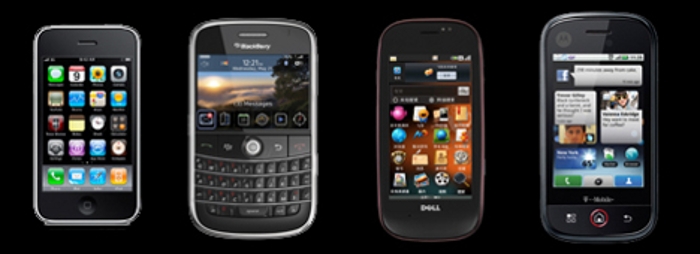
© Evertiq Compilation
Electronics Production |
Nokia loses out to Samsung and Apple
During the quarter Samsung shipments increased 5.3% year-on-year to 13.2 million units and became the biggest mobile phone maker in the region with 29.3% market share.
The Western European mobile phone market grew 5% year-on-year to 45 million units in the first quarter of 2011 (1Q11), according to the International Data Corporation (IDC) European Quarterly Mobile Phone Tracker.
During the quarter Samsung shipments increased 5.3% year-on-year to 13.2 million units and became the biggest mobile phone maker in the region with 29.3% market share. Nokia shipments dropped 10.3% year-on-year to 12.6 million units and is now the second player with 27.9% market share. In the smartphones segment, Apple shipments increased 48.9% year-on-year to 4.4 million units and became the biggest player with 20.8% market share. Nokia comes second with 19.6% market share.
"Samsung and Apple achieved outstanding milestones this quarter in the region. Samsung became the biggest mobile phone vendor in Western Europe and Apple the biggest smartphone vendor. These results show how volatile this market is and how important it is not to underestimate the trends. Companies like Nokia (and Ericsson in the past) may have strong brands and big market shares as Nokia always had, but can be overtaken by their competitors on a blink of an eye," said Francisco Jeronimo, European mobile devices research manager, IDC.
Top Western European Mobile Phone Vendors, Total Shipments and Market Share, 1Q11 (Smartphones and Feature Phones Combined) (Units in Millions)
 © IDC
Top Western European Mobile Phone Vendors, Shipments and Market Share, 1Q11 (Smartphones Only)(Units in Millions)
© IDC
Top Western European Mobile Phone Vendors, Shipments and Market Share, 1Q11 (Smartphones Only)(Units in Millions)
 © IDC
"Nokia is one of the most recognized and appreciated brands in Europe, but Samsung was the one understanding the trends first and moving faster. Samsung understood early the trend on touchscreen devices and became the market leader on feature-phones by providing a full range of devices at very competitive prices. On smartphones, Samsung has quickly moved to Android as well as investing in its own platform, Bada. Flexibility and being able to address all market segments have contributed to Samsung's ability to quickly adjust to the market trends. Apple, on the other hand, coming from nowhere in the mobile phone business, capitalized on its strong brand and user-experience innovation. It took years for competitors to come up with devices that could challenge consumers' preference for the iPhone."
During the quarter smartphones shipments increased 76% year-on-year to 21.2 million units to represent 47% of total mobile phone shipments. Android was the smartphones operating system leader with 35.7% market share. Those vendors focusing mainly on Android have notably been improving their market positions on smartphones, which shows how successfully this OS attracts consumers to smartphones, driving manufacturers' sales. Secondly comes iOS with 20.8% market share due the popularity of the iPhone. Symbian slipped to third place with 20.5% market share.
© IDC
"Nokia is one of the most recognized and appreciated brands in Europe, but Samsung was the one understanding the trends first and moving faster. Samsung understood early the trend on touchscreen devices and became the market leader on feature-phones by providing a full range of devices at very competitive prices. On smartphones, Samsung has quickly moved to Android as well as investing in its own platform, Bada. Flexibility and being able to address all market segments have contributed to Samsung's ability to quickly adjust to the market trends. Apple, on the other hand, coming from nowhere in the mobile phone business, capitalized on its strong brand and user-experience innovation. It took years for competitors to come up with devices that could challenge consumers' preference for the iPhone."
During the quarter smartphones shipments increased 76% year-on-year to 21.2 million units to represent 47% of total mobile phone shipments. Android was the smartphones operating system leader with 35.7% market share. Those vendors focusing mainly on Android have notably been improving their market positions on smartphones, which shows how successfully this OS attracts consumers to smartphones, driving manufacturers' sales. Secondly comes iOS with 20.8% market share due the popularity of the iPhone. Symbian slipped to third place with 20.5% market share.
 © IDC
Top Western European Mobile Phone Vendors, Shipments and Market Share, 1Q11 (Smartphones Only)(Units in Millions)
© IDC
Top Western European Mobile Phone Vendors, Shipments and Market Share, 1Q11 (Smartphones Only)(Units in Millions)
 © IDC
"Nokia is one of the most recognized and appreciated brands in Europe, but Samsung was the one understanding the trends first and moving faster. Samsung understood early the trend on touchscreen devices and became the market leader on feature-phones by providing a full range of devices at very competitive prices. On smartphones, Samsung has quickly moved to Android as well as investing in its own platform, Bada. Flexibility and being able to address all market segments have contributed to Samsung's ability to quickly adjust to the market trends. Apple, on the other hand, coming from nowhere in the mobile phone business, capitalized on its strong brand and user-experience innovation. It took years for competitors to come up with devices that could challenge consumers' preference for the iPhone."
During the quarter smartphones shipments increased 76% year-on-year to 21.2 million units to represent 47% of total mobile phone shipments. Android was the smartphones operating system leader with 35.7% market share. Those vendors focusing mainly on Android have notably been improving their market positions on smartphones, which shows how successfully this OS attracts consumers to smartphones, driving manufacturers' sales. Secondly comes iOS with 20.8% market share due the popularity of the iPhone. Symbian slipped to third place with 20.5% market share.
© IDC
"Nokia is one of the most recognized and appreciated brands in Europe, but Samsung was the one understanding the trends first and moving faster. Samsung understood early the trend on touchscreen devices and became the market leader on feature-phones by providing a full range of devices at very competitive prices. On smartphones, Samsung has quickly moved to Android as well as investing in its own platform, Bada. Flexibility and being able to address all market segments have contributed to Samsung's ability to quickly adjust to the market trends. Apple, on the other hand, coming from nowhere in the mobile phone business, capitalized on its strong brand and user-experience innovation. It took years for competitors to come up with devices that could challenge consumers' preference for the iPhone."
During the quarter smartphones shipments increased 76% year-on-year to 21.2 million units to represent 47% of total mobile phone shipments. Android was the smartphones operating system leader with 35.7% market share. Those vendors focusing mainly on Android have notably been improving their market positions on smartphones, which shows how successfully this OS attracts consumers to smartphones, driving manufacturers' sales. Secondly comes iOS with 20.8% market share due the popularity of the iPhone. Symbian slipped to third place with 20.5% market share.





